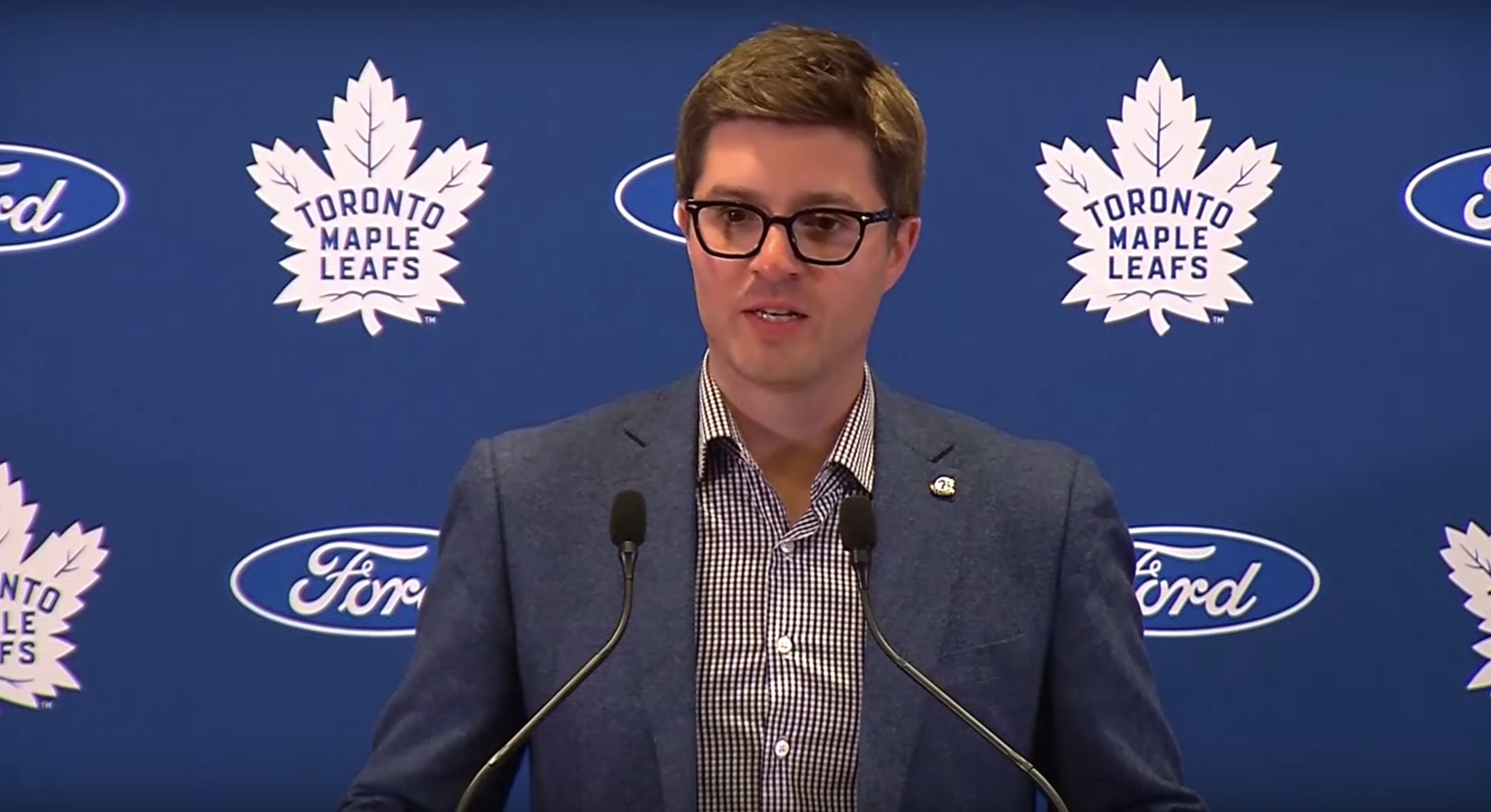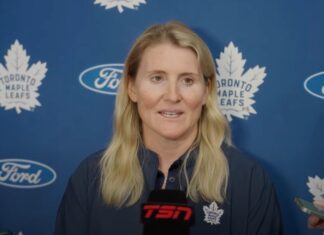Kyle Dubas addressed the media on the Hockey Night in Canada broadcast as well as a scheduled press conference after announcing a six-year, $45 million contract for William Nylander at the final hour. Full remarks below.
News started to pour in just minutes before the five o’clock deadline. Can you take us through the timeline from the start to ultimately where we ended up in a position where William Nylander agreed to a six-year deal?
Dubas: We’ve obviously been having a lot of communication with their camp — with William and with Lewis Gross — and we had a number of discussions all day, culminating with the discussion with William and Lewis at about 3:15 here central time. The deadline was 4:00. We quickly got everything signed and into the league, so literally right down to the wire.
What did you learn about this whole process in your first big negotiation as a GM in the NHL?
Dubas: I think John was probably the first big negotiation, so… It was an interesting process. You learn a lot about… There was a lot that went into it, right? The economics of the league and of our team factor into it. As a restricted free agent, other teams can talk to them as well and they have their opinions of what the player should make and that influences things. But we’ve got our structure here and we’re happy to have him signed for the six seasons and look forward to welcoming him back to Toronto tomorrow.
At the start of training camp, you said there is a process you guys are going to follow when it comes to this negotiation. Did you have to deviate from this process at all to try to get this deal done?
Dubas: I think that we wish the process would’ve yielded a signing prior to training camp, but that is the way that these things go. They’ve never really gone this late or come to this, but we are obviously happy that it ended up with Willy signing. It’s a real great testament to our coaches and our players that they were able to mitigate the distraction of it and obviously perform the way they have so far. It’s exciting to add William back to the group in its current state.
Ultimately, it’s about getting the player signed and you did that. In terms of Nylander and a couple of other entry-level deals that are going to expire next year, is there anything that you would’ve done differently here?
Dubas: No, I think now it is tough to reflect and say there was for sure something we would’ve done differently or not, but I think in the end, our process was sound. Sometimes these things take some time. I wish it wouldn’t have taken as much time mostly for the players and the coaches and William himself. But we’re happy that he is back and happy to see him here as we get rolling next week.
Have you spoken to William? What did you say to him?
Dubas: I’ve spoken to William lots throughout the process. I know he is very, very excited tonight and we are excited for him. It would’ve been a shame for him to not be in the NHL this year. He is a top young NHL player. We are excited to have him back and excited for him to get to work with our coaching staff and with our team.
One of the more popular images throughout this whole thing was the two kids on Halloween playing you and William getting a deal signed. What were you thinking every time you saw that image?
Dubas: [Laughs] It’s interesting. I never really imagined I’d become a Halloween costume for anybody, so that is interesting. I am happy we were able to make it a reality today, so it’s all good. Maybe months too late, but it’s all good.
Was this process a bit of an emotional rollercoaster, Kyle?
Dubas: We had our process and we’ve got a great staff with Brandon and Laurence. Brandon was along for this trip as well and was always there to help guide things. It wasn’t really an emotional experience. At the end, it becomes a little bit frantic when it goes right down to the deadline at the very end and you are just trying to make sure everything gets in. The worst case is that there would’ve been a technical glitch that prevented this from going past the five o’clock deadline. No real emotion; just stuck to our process and worked together with Lewis Gross and William to complete it just under the wire.
Was there a point in which you thought it wasn’t going to happen?
Dubas: It’s tough to say. I think we always try to remain optimistic and have faith that our offers were fair and they were coming from a good place as well in that, in the end, him missing a full season and having him go across five o’clock today wouldn’t have been good for anybody — not for the team, not for William. We always kind of maintained that faith. As it gets closer to deadline, you start to maybe doubt it a little bit, but in the end, we are happy that it ended with him signing, for sure.
Were you prepared for that if it came to it?
Dubas: I think so, yeah. Any time you get into something like this, especially when you get to the last day, you think it might be reality. It is my duty to the organization, and our group and our management group’s duty, to make sure we are putting the organization in the best possible position moving forward with all our economics and all of our players, so we have to do what is right for that and part of that may be situations like this one. We hope to always avoid them of course, but it’s a realistic scenario as we just saw.
How many different offers were there that went back and forth?
Dubas: Lots. I haven’t counted them up. It was just get the deal done and get everything in, get showered, and head over here for the game. I’ll let you know when we do the official count.
What makes this a reasonable deal, a fair deal, in your mind?
Dubas: In the end, we found a way… We have a cap situation this year which affords us the ability to structure it the way that we did and be able to compromise with William on what they wanted and also for us in the out years being a number as we planned with our team for us to become a consistent team that gets in the hunt and is contending year in and year out… that we could certainly fit that in and have him be a part of this for a long time, especially with the others on the horizon. That’s the way we approached it and we didn’t really stray from that.
That $6.9 million number… did that vary much from your original offer?
Dubas: I think all offers vary in negotiations. I am not going to get into where our offer started and where theirs started, but essentially, we worked together to get to that point and we are happy with it. I know Willy will be well worth that.
What is your sense right now? Is it one of relief, one of satisfaction? What are you feeling?
Dubas: I am happy for our team and I am happy for William. I wish that we were able to get this done before training camp and that he was able to be a part of this. I think the team’s record right now is a testament to the coaching staff and the players on the group. They haven’t let this become a distraction. I totally understand the questions about It have picked up of late. They’ve continued to stay focused and they’ve had a great start to the season.
I’ve learned a lot about the coaches and the players and their ability to do so. I am very thankful for them that they were able to perform the way they had. I am excited now to add William to the group because it will only make us better.
You are on the record as saying you are going to keep the core together, whatever it takes. How does it look right now with this contract and looking at the rest of the team?
Dubas: I know people were ready to jam that one down my throat [laughs]. But we’ll stick with it and that’s our goal. We want this group to be together as long as we can possibly keep it together. We hope that all of these guys can be career Leafs, especially this young group of core players we have. It’s an exciting group and one that has excited our fans and our city. That’s our goal: to keep it together as long as it can roll.
There was a thought that if this ever came to a trade, a young defenseman might be coming back. Is that an area you still need to improve here to make a proper run?
Dubas: That stuff… that is a natural thing in hockey, especially when a player isn’t there. People hear rumblings that his contract may be problematic. That was never our ambition. This was always, and I think other GMs in the league can verify it — we prefaced everything with, “Our ambition is to sign this player long term. That is what we are working towards.” In discussions, we had lots of players that come up — not just defense. Anywhere that we can improve the team, we will.
This December 1st deadline is a bit different than in recent years. Does this process change your idea of how you are going to deal with Marner and Matthews and others going forward, that maybe your timeline has to be a bit different?
Dubas: Sure. We’ve had discussions with both of their camps already. The way that I had come into this — I know Lou had spoken to Lewis last year. I don’t know the exact specifics of it. We’ve had discussions with Judd Muldaver and Darren Ferris and we will continue to do that. Obviously, we want to avoid a situation where not all of our players are here at training camp. This is the furthest any of these has gone to within five minutes of the deadline.
You’re making history!
Dubas: Not in the way we’d like to. We hope to on the ice in time. We will continue to work with those guys. We are happy to have this solution. It’s not the preferred timing of the solution.
Why did it send up being so difficult, do you think?
Dubas: That’s probably more of a question for Lewis. They were in entrenched in their spot and we were in ours. The looming number of young players that are coming after this season plays into that and what’s going to happen with the economics of the game and so on and so forth. I can’t answer that specifically. We just tried to stick to our process that we follow in each of them. I do appreciate the amount of effort and work Lewis and William put into this throughout. They were very responsive and good to deal with.
Did you talk to William?
Dubas: Yeah. I talked to William throughout. Obviously, we’ve met throughout and talked on the phone and texted. We’ve stayed in touch. I know people can make it seem like it is contentious, and maybe at points people deemed that it was, but when he gets back here and gets rolling, it will all be gone and we’ll be thrilled to have him back.
Does the process on July 1st seem easier than what you guys have just gone through here?
Dubas: Not really, I guess. There were a bunch of other teams involved and a different set of emotions. It’s always interesting. You are very happy when things come to their conclusion and they work out in the favour of everybody — John coming here on July 1st and now William with his situation being solved now. I think we have been fortunate that none of those have gone against us so far and we will continue to work to keep them that way.
Do you think this will be a precedent we are going to see not just with your team but other teams across the league?
Dubas: I hope not. I hope that for the sake of everybody — the players, the teams, the game in general — that teams and players are able to work together and have everybody there in time for training camp and get everything sorted and done. I think it’s great for the fans and it’s great for the game in general to have every great young player available and every exciting young player available to be out here every night. We have deprived the fans of that for two months. We are happy to get one back.
If players coming off of their entry-level had arbitration rights, would that make life easier for everybody?
Dubas: That is a question for people way above my pay grade. With players that have it, there is a remedy that is available to them, but you’ve got to go a certain number of years and earn a certain number of pro years before you get there. I know in other sports they don’t have it. That’s up to the commissioner’s office, not me.
When do you expect he’ll start playing?
Dubas: We’ve got to go through the same protocol you’d go through coming in from training camp. I would say patience with that. He’s got to go through his medical testing. Though everyone wants to get back and get playing, we’ve still got to play the long game with it. It’s a six-year contract and we don’t want to rush to get him in on Tuesday or Thursday and have that forgo his health and well-being. We will get that all taken care of and we’ll hope in the next week or so he’ll be back in action.
Does Mike know that yet?
Dubas: I broke it to Mike, so we’re good.
The contract is a bit different because the cap hit is so big for the first year because of the timing. Does that impact your ability to do other things this season if you want to add at the deadline?
Dubas: The way that our salary cap is structured for this season… We were obviously saving space for William that is accrued daily since the start of the season and we’ve got some space set aside for our bonuses that may be due, but we’ll still be able to potentially add to the group. If we can strengthen the group, we will.
How optimistic are you that you can avoid a similarly lengthy process with your other RFAs?
Dubas: That’s the plan, is to avoid it. It is our full plan to have everyone available for the first day of training camp. I think we’ve shown that when it comes to making sure everything fits our economics, we will go to whatever length we have to. Our goal is to have everyone settled as soon as we possibly can and that allows us to plan for the remainder of the year and roll from there.
Around what time did you actually agree to terms?
Dubas: We got their signed copy of the contract back at 3:52 central time. It was agreed to, but then there were some slight variations that needed to be made. The email over there was sent back and then you make sure it is good and send it to the league. The worst thing would be if you have a page missing and the contract is rejected at this point. That would be not good.
Were you nervously watching the clock?
Dubas: I’ve got a lot of faith in Brandon Pridham and he certainly has shown that that faith is well placed throughout this process. I thought we would be in good hands even though it was a bit more of undue pressure placed on him by me, which, anyway…
Did you feel there was a turning point in this process?
Dubas: When they called at 3:30 and William said, “Do you want to make a deal?” That was the turning point, I’d say.
You spoke to him at 3:30?
Dubas: Yeah, he and Lewis called at about 3:30. At that point, once he had said what he did and I spoke to Lewis for a bit, I kind of knew we were on the right track. Right down to the wire.
Were the three of you in the conference room at the hotel, then?
Dubas: We were in my room at the hotel. I am sick of that room at the St. Paul Hotel.
To clarify, at 3:30 central time, so half an hour from the deadline?
Dubas: Yes, that is correct. Maybe it was 3:15. I could check. I don’t have my phone on me, but within the hour.

































